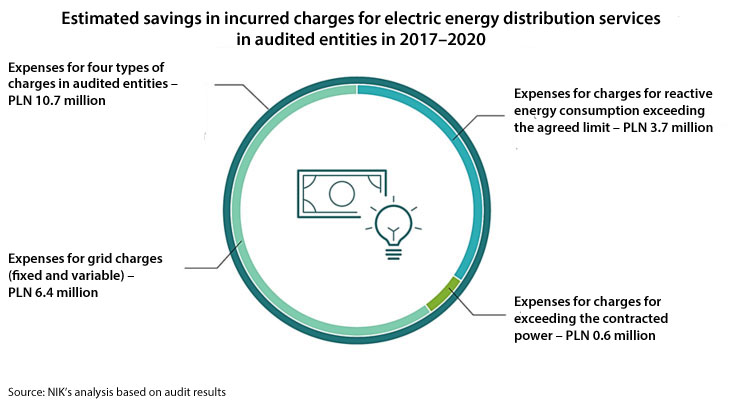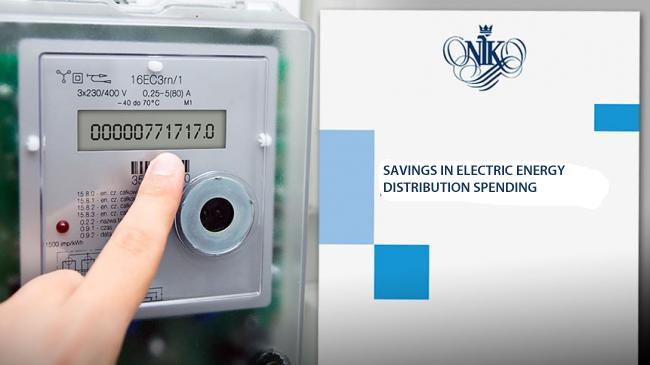Public finance entities spend a lot on electric energy, i.e. on the purchase of active energy and electric energy distribution services. They focus on making savings on the purchase of active energy (electric energy that is converted into work, e.g. heat, movement, light), to reduce the use of energy and obtain a good price for 1 kWh. Charges for electric energy distribution are fixed in the tariffs of distribution system operators and users do not have any impact on their levels. However, users may reduce expenses for electric energy distribution services. They can do it by:
- ordering contracted power tailor-made to actual needs of the given entity in individual settling periods;
- using multi-zone tariff group adapted to active energy consumption in specific times of the day;
- installing compensation circuits to reduce reactive energy consumption.
Data provided by the audited entities show that the expenses for electric energy distribution services made up 40% of electric energy expenses.

Electric energy users (including public finance entities) sign a distribution services agreement with the distribution system operator (DSO) that is the owner of the grid and connectors in a given area. Energy users cannot choose another DSO. The distribution system operator defines settlement principles for provided distribution services and charges in the document “Tariff for electric energy distribution charges”. The tariff is approved by the decision of the President of the Energy Regulatory Office.
Since the pre-audit analysis pointed to a risk of significant irregularities in terms of expenses incurred by the public finance entities for electric energy distribution services, NIK resolved to take this area under the microscope.
Key audit findings
Most of the audited public finance entities did not apply the principle of economic public spending when purchasing electric energy distribution services. In 19 of 22 audited entities NIK identified irregularities which had adverse financial impact on their activity. NIK auditors estimated potential savings in the audited entities at PLN 10.7 million.

The NIK audit findings show that savings on charges for electric energy distribution services could have been made in four areas:
- charges for reactive energy consumption exceeding the agreed limit. Spending PLN 3.7 million on that purpose in 2017-2019 was found unjustified. Installation of reactive energy compensation circuits could help reduce the charges.
- fixed grid charge. Contracted energy was not tailored to real demand of individual facilities and so the charge spending was excessive. In 2018–2020, the audited entities could have saved PLN 2.5 million.
- charges for exceeding contracted energy. Causes of energy excesses were not analysed and high charges were accepted. Adequate measures could have brought savings of nearly PLN 0.6 million in 2017–2019.
- variable grid charge. Savings were possible thanks to proper selection of multi-zone tariff group tailored to active energy consumption in individual time zones. In 2017-2019, the entities could reduce their expenses by PLN 3.9 million.
Potential savings nationwide in 2019 were estimated at over PLN 115 million – correspondingly PLN 92.6 million for reactive energy consumption exceeding the agreed limit and PLN 22.6 million for exceeding the contracted power.
The audit findings indicate that employees of the audited entities (i.e. courts, prosecutor’s offices, police stations or universities) usually lacked essential knowledge about possible methods of saving public funds incurred for charges for electric energy distribution services. As a result, invoice data related to electric energy distribution charges were not analysed in a reliable or complex way. Public finance entities believed that expenses for electric energy distribution charges cannot be optimised.
Only three audited entities took proper and comprehensive actions to limit expenses for electric energy distribution services. As a consequence, energy expenses of the Opole University of Technology decreased in 2019 by PLN 280 thousand, of the Tax Chamber in Gdańsk by about PLN 100 thousand and of the District Court in Lublin by over PLN 50 thousand.
The President of the Energy Regulatory Office did not properly protect the interests of energy users. He failed to control if the distribution system operators correctly applied electric energy tariffs to energy users.
According to NIK, the Minister of Energy should verify the existing system of calculating fixed and variable grid charges with a view to standardising and simplifying it. The approach of the largest operators to establishing variable grid charges was diversified.
On the other hand, the fixed grid charge is calculated based on the declared value of contracted energy. The NIK audit results reveal that the public finance entities have significant problems in managing the contracted energy value.
De lege ferenda proposals
The audit results indicate that the applicable law needs to be changed. That is why, NIK has recommended amending the ordinance of the Minister of Energy of 6 March 2019 on electric energy tariffs.
Recommendations
To the Minister of Energy
To consider changes to the system of calculating charges for electric energy distribution.
To the President of the Council of Ministers
To keep public finance entities informed about the possibilities of making savings on electric energy distribution charges.
To the President of the Energy Regulatory Office
- to control the use of statutorily defined tariffs;
- to analyse and verify costs considered by power companies as justified in calculating charges for reactive energy consumption exceeding the agreed limit, by demanding information about those costs from them.
To public finance entities
- to conduct analyses of electric energy distribution costs, including individual charges;
- to take efforts to limit expenditures for energy distribution services.


